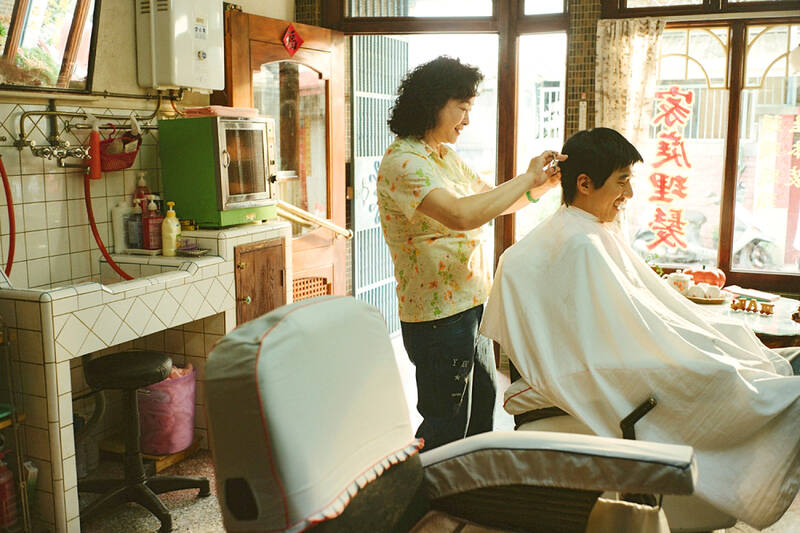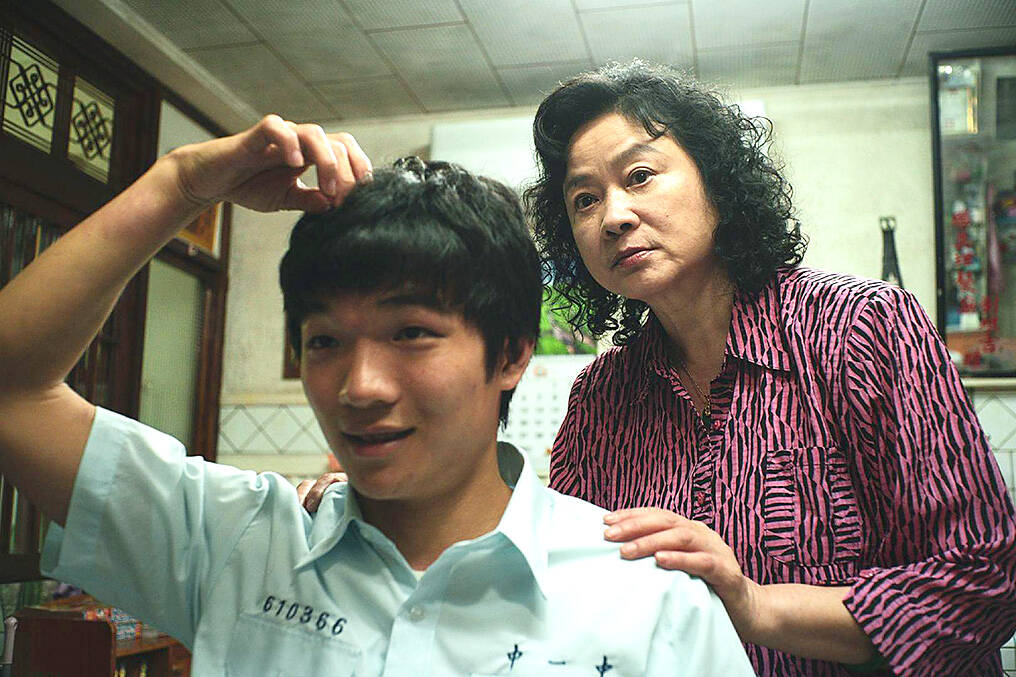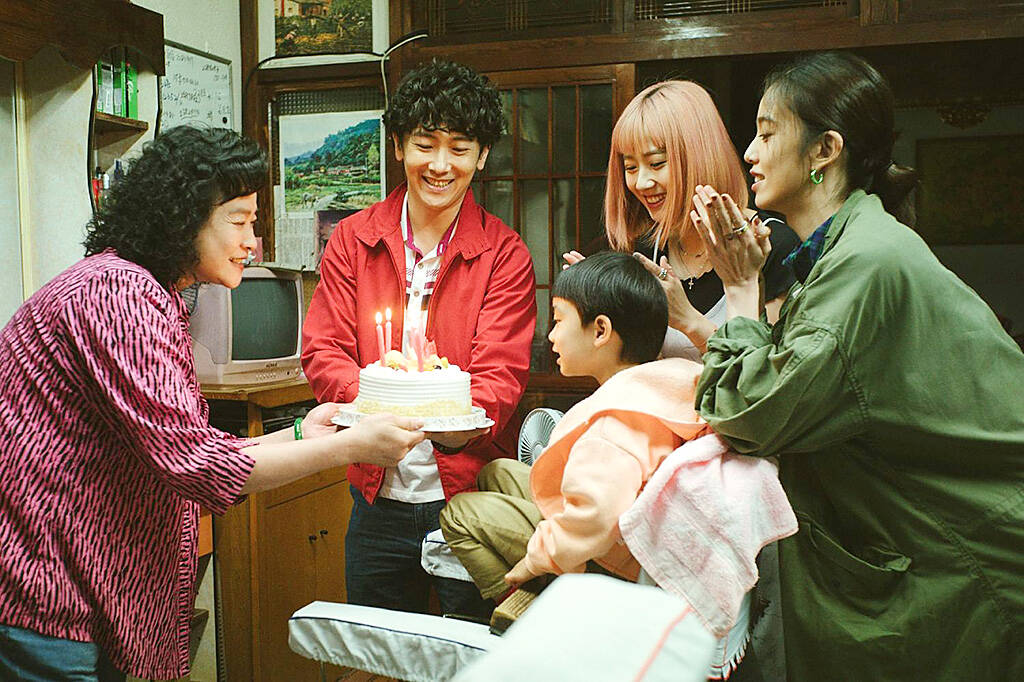During the 1980s, sex symbol Lu Hsiao-fen (陸小芬) was known for her bold behavior and suggestive performances. But in in Day Off (本日公休), her first film role in 23 years, Liu, 66, plays kind-hearted yet stubborn hairdresser A-Rui, who struggles with social and generational change.
Operating an old-school barber shop from her home, A-Rui has had the same customers for decades.
“You’re in charge of all of our heads,” one quips.

Photo courtesy of Vie Vision Pictures
A-Rui prides herself on knowing exactly what each customer wants without needing to ask, and her shop is also a place for locals to socialize. She personally calls each customer to remind them that it’s time for a haircut, and balks when her daughter A-Ling (Beatrice Fang, 方志友) — also a hairdresser — suggests an automatic scheduling notification app.
This story is based on director Fu Tien-yu’s (傅天余) experiences growing up in her mother’s hair salon. Many of the scenes actually happened, such as the old man who barged into the shop early in the morning to dye his hair black after dreaming of his dead wife scolding him about his appearance, or the teenager who was dragged back to the store by his angry mother after he got a trendy haircut to impress his girlfriend.
With decades of material to draw from, the slices of life in the salon and the way A-Rui runs it are vivid and humorous, providing an intimate peek into these establishments that can still be seen in older neighborhoods, but might not be around for much longer.

Photo courtesy of Vie Vision Pictures
Lu has turned down numerous movie roles over the years, but she says she was especially moved by this script. Having no hairdressing experience, she went through three months of training and also took acting classes to brush up on her skills.
Although Lu portrays A-Rui’s subdued but strong personality with nuance, the other characters in the film are one-dimensional, as if they exist just to highlight certain values. A-Rui’s rejection of modernity and insistence that customer relationships are more important than money is countered by the ambitious A-Ling, who plans to open an NT$100 salon that offers 10-minute, in-and-out services. She cannot believe that her mother is not charging extra to travel all the way to Changhua to cut the hair of a long-time customer who cannot move anymore.
A-Ling’s ex-husband A-Chuan (Fu Meng-po, 傅孟波), a mechanic, is like A-Rui, but he’s nice to a fault and keeps letting customers defer their payments for various reasons, even at one point lending his life savings to a friend in need. He also spends more time with A-Rui than the others — even though he and A-ling are divorced. People are usually more complex than this.

Photo courtesy of Vie Vision Pictures
Like the characters, the story itself is very straightforward and evenly paced, detailing a few transformative months in the family’s ordinary lives. It certainly has a lot of heart and offers a few laughs and tear jerking moments, but the plot and characters often come off as a motivational video for some forgotten past that probably never existed.
The biggest problem is the dialogue, which is too deliberate and moralistic. Cars and haircuts are often used as metaphors for the feelings of the characters, or to foreshadow subsequent events, which came of as unnatural.
The movie is still worth watching for Lu’s portrayal and the detailed depiction of a traditional establishment; it might even be the last time to see Lu on screen as she’s suggested in interviews that she is retiring for good.

Taiwan has next to no political engagement in Myanmar, either with the ruling military junta nor the dozens of armed groups who’ve in the last five years taken over around two-thirds of the nation’s territory in a sprawling, patchwork civil war. But early last month, the leader of one relatively minor Burmese revolutionary faction, General Nerdah Bomya, who is also an alleged war criminal, made a low key visit to Taipei, where he met with a member of President William Lai’s (賴清德) staff, a retired Taiwanese military official and several academics. “I feel like Taiwan is a good example of

March 2 to March 8 Gunfire rang out along the shore of the frontline island of Lieyu (烈嶼) on a foggy afternoon on March 7, 1987. By the time it was over, about 20 unarmed Vietnamese refugees — men, women, elderly and children — were dead. They were hastily buried, followed by decades of silence. Months later, opposition politicians and journalists tried to uncover what had happened, but conflicting accounts only deepened the confusion. One version suggested that government troops had mistakenly killed their own operatives attempting to return home from Vietnam. The military maintained that the

Jacques Poissant’s suffering stopped the day he asked his daughter if it would be “cowardly to ask to be helped to die.” The retired Canadian insurance adviser was 93, and “was wasting away” after a long battle with prostate cancer. “He no longer had any zest for life,” Josee Poissant said. Last year her mother made the same choice at 96 when she realized she would not be getting out of hospital. She died surrounded by her children and their partners listening to the music she loved. “She was at peace. She sang until she went to sleep.” Josee Poissant remembers it as a beautiful

Before the last section of the round-the-island railway was electrified, one old blue train still chugged back and forth between Pingtung County’s Fangliao (枋寮) and Taitung (台東) stations once a day. It was so slow, was so hot (it had no air conditioning) and covered such a short distance, that the low fare still failed to attract many riders. This relic of the past was finally retired when the South Link Line was fully electrified on Dec. 23, 2020. A wave of nostalgia surrounded the termination of the Ordinary Train service, as these train carriages had been in use for decades